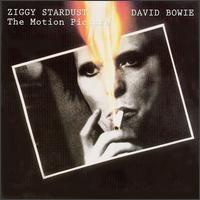
- Format: MP3

After performing his second-to-last selection, "White Light/White Heat," a tune by Lou Reed, the songwriter who most influenced Bowie's enduring and indelible persona — "Ziggy Stardust" — Bowie drops this little nugget on his bandmates and fans: "Not only is it the last show of the tour, but it's the last show that we'll ever do. Thank you." He then goes into a magnificent version of "Rock & Roll Suicide," a song that gives a glimpse of where Bowie could have gone, not to suicide, but to the style of rock & roll that a long-term band can provide. Had David Bowie kept the Spiders from Mars together, unique flashes like the version of "Let's Spend the Night Together" or the striking "All the Young Dudes would have continued, a tight little rock & roll band providing a balance that dissipated when the artist branched out on his own. The other unnerving thing about this double-LP soundtrack of a concert taped in 1973 released in 1982 is that there are bootlegs which have more to offer sonically. The thin recording is shameful — don't expect Pink Floyd's Delicate Sound of Thunder or even the Rolling Stones' wonderfully sludgy "Get Your Ya Ya's Out." The remix of this only official live album from the Ziggy Stardust shows is dreadful. Ziggy Stardust: The Motion Picture doesn't have the electric excitement of the Santa Monica Live, 1972 boot, and that's the fault of the remix by Mike Moran, Bruce Tergeson, Tony Visconti, and Bowie. Another bootleg, David Bowie With the Spiders From Mars, London, July 3, 1973, is the exact same Ziggy performance, but it comes across better, much better. According to Pimm Jal de la Parra's book David Bowie: The Concert Tapes, the bootleg was issued from the ABC TV 1974 broadcast. The bootleg also has "Jean Genie and "Love Me Do," which feature Jeff Beck on guitar, Beck's performances being absent from the official RCA soundtrack release. The shame of it all is that this double disc was released after David Live and Stage, and while the upside is it makes for a rare three double-live sets from one performer, the downside is that the best of those three albums has the worst mix on official record. Also, had RCA released the October 1, 1972 Boston Music Hall show — which was brilliant, despite Bowie having a cold that night — or this July 3, 1973 London Hammersmith Odeon program back in the day, it could have had an enormous effect on Bowie's career. The fans cultivated at that point in time wanted more Ziggy, and the timing of this release only shows how important it is to get the material out while it's hot. Just ask Peter Frampton, Bob Seger, and the J. Geils Band, who solidified their audiences with double live sets at crucial points in their careers. Nonetheless, everything here is essential David Bowie, and it IS a great performance, and you definitely need it for your Bowie collection. The only thing better would be Lou Reed himself finally releasing the September 1973 first gig of his Rock 'n' Roll Animal Band — that was, as they say, the real thing.